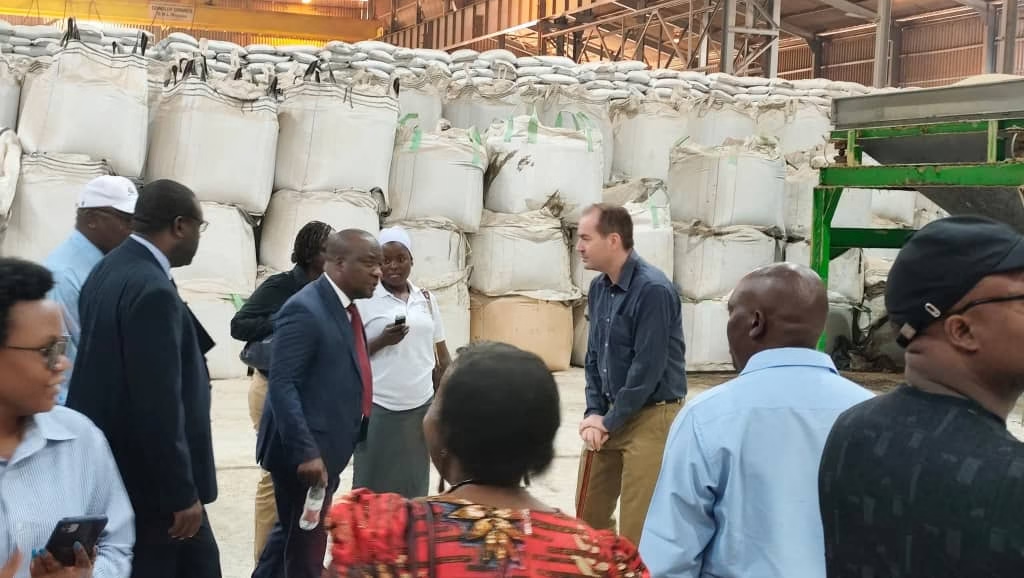
Zimbabwe’s drive towards agricultural self-sufficiency has received a major boost following the mobilisation of a US$125 million facility by the Mutapa Investment Fund (MIF) from the African Export-Import Bank (Afreximbank). The financing is expected to capacitate the entire fertiliser value chain ahead of the 2025–2026 summer cropping season.
The development was revealed on Wednesday during a Parliamentary Portfolio Committee on Industry and Commerce tour of Harare-based fertiliser firms. According to MIF Head for Agriculture and Industrials, Mr Tatenda Chimusoro, the facility will be directed towards the procurement of critical raw materials for fertiliser production. “We are negotiating the facility on behalf of the Afreximbank and finer details of the plan will be rolled out in due course. Already we have also mobilised another facility at Dorowa for the production of phosphate,” he said.
The Industrial Development Corporation of Zimbabwe (IDCZ), which is fully owned by MIF and controls key fertiliser firms across the country, said the financing will mark a turning point for the industry. Group Chief Executive Officer, Mr Edward Tome, emphasised that the facility would reduce reliance on imports and strengthen national food security. “We are looking forward to a situation whereby the fertiliser value chains will play a pivotal role in ensuring that fertiliser imports are reduced, thereby increasing confidence in the value chains,” he noted.
Lawmakers also underscored the strategic significance of the intervention. Parliamentary Portfolio Committee on Industry and Commerce Chairperson, Honourable Clemence Chiduwa, said the Committee’s visit was aimed at assessing industrial capacity, identifying bottlenecks, and charting policy direction. “The purpose of this visit is critical. I think it serves as a purpose for us to probe the sector, identify the challenges and map the way forward. As legislators, we want a vibrant fertiliser producing value chain that unlocks output and positions Zimbabwe as a vibrant fertiliser producing nation,” he said.
Findings during the tour pointed to the fertiliser industry as an essential enabler of agricultural growth, with a direct impact on yields of strategic crops such as maize, wheat, and tobacco. Fertiliser availability has historically been one of the biggest challenges for farmers, particularly during peak planting seasons, often forcing government to intervene with costly imports.
By mobilising local and external funding, MIF is positioning Zimbabwe to achieve greater self-sufficiency in agricultural inputs, which is a key pillar of the National Development Strategy 1 and Vision 2030. Analysts note that the move could save millions in foreign currency, stabilise supply chains, and support consistent production levels in the agriculture sector, which contributes more than 15 percent to national GDP.
The Afreximbank-backed facility, combined with local phosphate production at Dorowa, represents not only a revival of domestic fertiliser manufacturing capacity but also a step toward making Zimbabwe a competitive player in regional agro-industry. For farmers, reliable fertiliser supply could mean improved yields, lower costs, and enhanced resilience in the face of climate variability.
As the 2025–2026 cropping season approaches, the US$125 million injection is being viewed as a game-changer that could unlock value across the agriculture sector, bolster food security, and reinforce Zimbabwe’s ambition to become an agricultural powerhouse in the region.
Zimbabwe Moves to Establish Specialised Courts to Tackle Drug Abuse Crisis
Zimbabwe is taking a decisive step in the fight against drug and substance abuse, with the Judicial Service Commission (JSC) set to establish specialised courts dedicated to handling related cases. The initiative comes as drug and substance abuse continues to devastate communities, threatening public health, social stability, and the future of young people.
A two-day training programme for judicial officers, underway in Harare, is focusing on how best the justice system can respond to the scourge by ensuring cases are expedited and deterrent sentences are delivered. The initiative marks a key component of the government’s broader strategy to curb the rising wave of substance abuse.
Minister of Justice, Legal and Parliamentary Affairs, Honourable Ziyambi Ziyambi, said the specialised courts would strengthen the justice system’s response by providing timely rulings and reinforcing society’s resilience against drugs. “It is a timely intervention that is necessary and speaks directly to the safety, health, and future of our communities. The government of the Republic of Zimbabwe condemns in the strongest terms the sketch of trial and substance abuse. Against this background, this training reflects the deepening of the political system,” he said.
Honourable Ziyambi added that the collaboration between the judiciary, the National Prosecuting Authority, and the executive would be central in addressing one of the greatest threats to Zimbabwe’s prosperity. “This is a commitment to a specialised, efficient and health-centred justice delivery system that protects society while rehabilitating those caught in the web of addiction,” he noted.
Deputy Prosecutor General, Mr Nelson Mutsonziwa, stressed that the Drug and Substance Abuse Courts would not only provide prosecutors and judges with benchmarks for sentencing but also ensure fairness and transparency. “The establishment of Drug and Substance Abuse Courts is an important component of the government’s decisive response to a problem that threatens the very fabric of our society and the stability of our institutions. There is also a need to balance speed with procedural fairness. The public requires a justice system that is not only robust but also swift and transparent,” he said.
The establishment of these courts complements the Zimbabwe Multi-Sectoral Drug and Substance Abuse Plan (2024–2030), which was launched to provide strategic direction in addressing the menace. The plan seeks to empower communities, families, and institutions to collectively fight drug abuse while offering rehabilitation and reintegration support for those affected.
Analysts note that Zimbabwe’s approach demonstrates recognition of drug abuse as not just a criminal justice issue, but a multifaceted social and health crisis requiring integrated solutions. The specialised courts are expected to improve the consistency of sentencing, reduce backlogs, and instill confidence in the justice system’s ability to respond to emerging threats.
As the country intensifies its fight, the success of these measures will depend on the balance between punitive deterrence and rehabilitative justice. With drug abuse threatening to derail Zimbabwe’s social fabric and future generations, the establishment of the specialised courts is being viewed as a critical step in the nation’s broader campaign to safeguard its people and economy from one of the gravest challenges of the decade.




